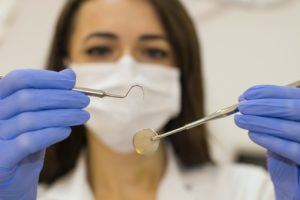When sitting in a dentist’s office, you’ll likely hear plenty of unfamiliar terminology between your dentist and their assistant(s). While it may seem intimidating to you – sitting in the chair having cavities filled or getting your teeth cleaned – your dentist is simply communicating with their assistants and specialists about your care. Read on to learn some terminology used by your dentist.
“We need to take a look at #13 and 14.”
You may hear numbers thrown around between your dentist and their assistants. Those numbers are designations for each of your teeth. In other words, each of your teeth is numbered, with one through 16 being the top set of teeth from left to the right and 17 through 32 on the bottom in the same directional order. Wisdom teeth are considered the first and last teeth (numbers 1 and 16 on top and 17 and 32 on the bottom). Whether you’ve had your wisdom teeth removed or not, the number order always stays the same. Click here for more information on what kind of teeth comprise the adult mouth and other helpful information.
Children’s baby teeth are represented similarly but identify with letters rather than numbers. In the upper jaw, teeth are labeled A through J and the bottom jaw is designated as K through T. When examined, children may also have a mixture of baby and adult teeth, which coordinate according to the type of teeth and the number or letter representation according to their position.
“I’d like you to go see a…”
Your dentist may refer you to a specialist if you need further examination and diagnosis. These specialized members of the dental field help in numerous ways. To help you familiarize yourself, here is a list of specialists your dentist may refer to you:
- Orthodontist – a specialist in straightening teeth

- Periodontist – gum health specialist
- Oral Surgeon – a specialist who handles extractions and other types of surgery
- Pedodontist – specializes in children and patients with specific disabilities
- Endodontist – specialty in root canals
Your dentist will know what kind of specialist to recommend if you need particular treatment(s) not covered by your regular dentist. If you have any questions or concerns, click here for more information about dental health or contact your dentist to schedule an appointment.












